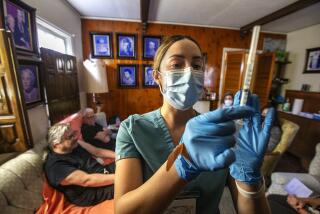Will COVID-19 vaccine scams target L.A. residents next?

- Share via
Amid the joyous arrival of the coronavirus vaccine — lauded as the beginning of the end of the deadly pandemic — lurks a sinister undercurrent.
Fraudsters peddling the promise of a dose have arrived in in the U.S., Europe and elsewhere. And Los Angeles city officials are concerned residents here could be the next target.
Frontline healthcare workers will receive the vaccine first. Wider distribution might not arrive until spring or summer. A several-month wait could fuel desperation among vulnerable populations, such as the elderly or people with preexisting health conditions, who aren’t in the front of the line, according to Los Angeles City Atty. Mike Feuer.
“That impatience could make them vulnerable to a scam, when someone says, ‘I can get it to you right now,’” Feuer said on Wednesday. Scams could come in the form of phone calls, emails, text messages or even someone knocking on the door, he said.
In a video posted on YouTube on Tuesday, Feuer urged Angelenos to stay vigilant for promises that sound too good to be true.
As early as March, the Federal Trade Commission began issuing warnings to companies making unsubstantiated health claims about the coronavirus, including offering fake test kits. Some con artists have posed as officials from the Centers for Disease Control and Prevention and World Health Organization to try to get people to cough up personal information. An offer for an underground COVID-19 vaccine, at about $80 a pop, recently surfaced in New York, Feuer said.
While Los Angeles officials have not yet received complaints, Feuer said it’s likely only a matter of time. Still, he said he hopes getting the word out now will stymie fraudsters’ efforts.
“Invariably scams that happen elsewhere happen in Los Angeles. We’ve seen that again and again,” he said. “If I have to wait until someone has received a fake vaccine, that means someone’s health has been jeopardized, and I’m not going to do that.”
Meanwhile, U.S. government officials are well aware that the pandemic has spawned its own niche of fraud that extends beyond counterfeit vaccines.
The FTC recently reported that it had received more than 131,000 complaints relating to the pandemic. Among other things, complaints included nonexistent charities, fake mortgage and student loan relief schemes — and unsubstantiated health claims.
“It is often the case that, following reports of a health scare, deceptive advertising or marketing touting ‘miracle cures’ quickly emerge,” Andrew Smith, director of the FTC’s Bureau of Consumer Protection, testified at a U.S. Senate hearing.
Residents in Los Angeles who encounter fraud should report it to the city attorney’s office and the FTC, Feuer said.
Times staff writer David Lazarus contributed to this report.
More to Read
Sign up for Essential California
The most important California stories and recommendations in your inbox every morning.
You may occasionally receive promotional content from the Los Angeles Times.











